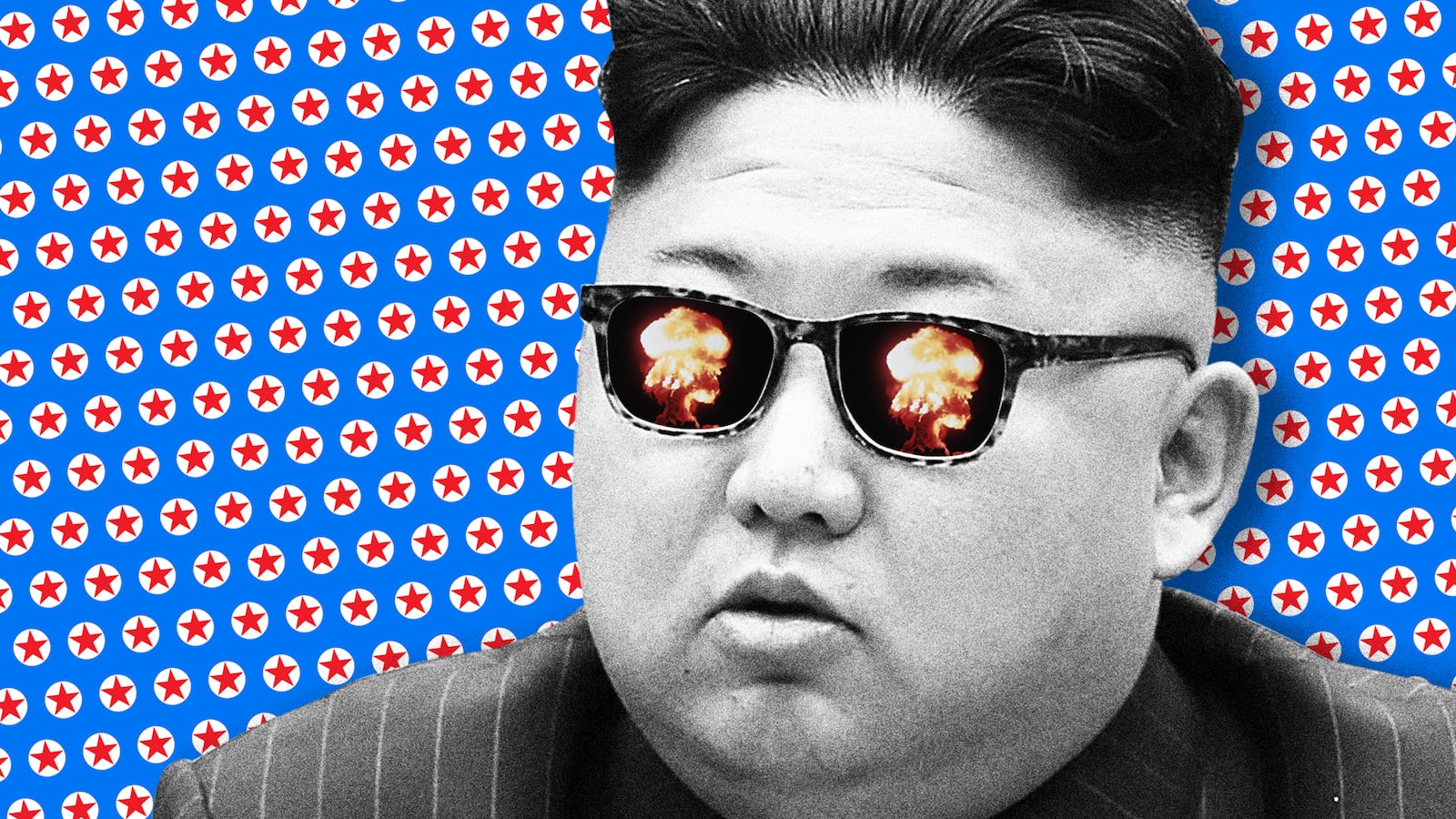Is anyone here sane?
On Friday, Kim Jong Un called President Donald Trump’s behavior “mentally deranged.” The North Korean leader made sure the world paid attention by issuing, for the first time ever, a formal public statement.
Trump, characteristically, chose a less formal method of communication when hitting back in the wee hours of Friday morning. The president tweeted Kim was “obviously a madman.”
Obviously, neither leader thinks the other is reliable. That’s a problem because each possesses an arsenal of the world’s most destructive weapons and both can launch on whim.
The enormously entertaining—and frightening—exchange of derogatory mental assessments tended to obscure critical developments during the ongoing United Nations General Assembly meeting. “It really is an extraordinary week at the UN,” Sung-Yoon Lee of the Fletcher School at Tufts University told The Daily Beast on Friday.
Yes, the week had been most unusual for two principal reasons. First, immediately after Kim’s statement, the North’s foreign minister, Ri Yong Ho, said his regime might detonate a thermonuclear device over the Pacific. An atmospheric test would be extremely provocative, but it could prove that Kim’s weapons specialists had not only mastered critical technologies but had also integrated them into weapons.
Therefore, a North Korean atmospheric test has been in the cards, as I noted after the Sept. 3 underground nuclear detonation. Pyongyang’s primary backers, the Chinese, conducted atmospheric tests when they wanted to prove their capabilities. They did that in October 1980, when they carried out the world’s last atmospheric test, and in October 1966, when they launched a nuke on a missile. Then, the missile carrying the device flew only over China.
The Democratic People’s Republic of Korea, as the North calls itself, is far too small for a missile launch and test in the open air, so it would have to pick a spot outside its borders for the demonstration.
A detonation over the Pacific Ocean would almost certainly require a North Korean missile to fly over Japan. It is not entirely clear whether Tokyo, as a political matter, could permit that to happen again.
On Aug. 29 and Sept. 15, Pyongyang sent missiles arching over Japan’s Hokkaido, and since then Tokyo has moved missile-defense units to that northern island. If the Japanese attempt to shoot down the next North Korean missile that overflies Hokkaido, Pyongyang will surely retaliate. Consequently, that could be when the world’s next crisis begins.
The second reason why the week was unusual is that on Thursday Trump announced sweeping sanctions against Pyongyang, a signal that his administration had lost patience with North Korea and was starting a new phase of diplomacy, a coercive one that might last years.
Trump’s measures, contained in an executive order, target, among others, foreign financial institutions that “knowingly” either conduct or facilitate “any significant transaction in connection with trade with North Korea” or engage in dealings with designated parties. Banks involved in prohibited dealings can lose their access to dollar accounts.
For a bank, the inability to conduct transactions in dollars is virtually a death sentence. In its most recent comprehensive survey, the Society for Worldwide Interbank Financial Telecommunication, better known as SWIFT, reported that globally the greenback accounted for 51.9 percent of currency usage by value.
Significantly, Trump yesterday thanked Chinese President Xi Jinping for a “very bold” move in directing China’s central bank to order commercial banks to stop business with North Korean customers.
If Trump accurately described Beijing’s actions, the Chinese set a world record for backtracking on promises. On Friday, Chinese Foreign Ministry spokesman Lu Kang denied that the People’s Bank of China, China’s central bank, had ordered banks to not take on new North Korean customers.
That denial suggests the U.S. and China are on a collision course. China is apparently not going to stop providing banking services to North Koreans. Trump is not going to allow any bank, Chinese or otherwise, to support Kim Jong Un’s economy.
If there will be a peaceful denuclearization of North Korea, Trump will have to make sure that Kim does not have the resources to build nukes, launch the missiles to deliver them, or to engage in “gift politics,” the buying off of senior regime elements with cars and other luxury items.
So who will win this zero-sum contest? The answer will define Trump’s presidency, not to mention the fate of the world.




